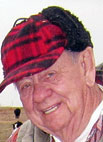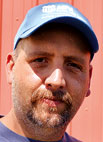
Bob Redfearn, or “California Bob” as he is known around Polk County was raised on a farm around Ft. Scott, Kan. He enjoyed the farm, but didn’t give it much thought when he left the farm when he was 20 years old to move to California to pursue his career. Bob was a roofing contractor and owned a variety of businesses during the 50 years he was gone.
Eight years ago, Bob came home. His good friend, Tracy Brown, raised Fox Trotters and sold him one of her up-and-coming 2-year-old stallions. She then encouraged them to enter in the National Fox Trotter show in Ava, Mo., that fall.
They did and much to Bob’s surprise that stud, Southern Nights, became the World Grand Champion as a two-year-old Stallion.
Each year in September he enters some of his stock in the Ava event which is a world event for the breed. With nine World Grand Champion broodmares and five different Grand Champions from Southern Knights bloodlines, people now know Bob Redfearn.
What Bob likes about raising Fox Trotters are the personalities of the horses. Each one is a little different but they are the most kind and gentle horses he has ever known.
Bob insists on pasture breeding. He likes to see the stud being able to run with the mares and enjoy that sense of freedom. Bob feels that is much more of a natural environment for them and just can’t see keeping his stud in a stall all year long. He thinks the exercise is good for the stud as well to stay in top condition. But having the stud in the pasture means you never know for sure the foaling dates. The foals aren’t like a calf, they are very fragile. You have a short window of time to get them to suckle or they just don’t make it.
Since he has been in Missouri he has also started raising Balancer bulls. He balances the Gelbvieh and the Angus to create a strong beef breed with the great mothering abilities of the Gelbvieh. Bob said they calve easy yet are quick weight gainers. They have a gentle disposition and are easy to work with. He loves the Balancers because they are such easy keepers, so gentle and he enjoys working with them on a regular basis.
Bob insists on taking care of his pastures for his cows. Each year he spreads chicken manure from a farm in Arkansas that is certified so he knows he is getting high quality manure with no litter. He also then no-till drills in the fall with a combination of seed that includes turnips, radishes, wheat, rye and vetch (which is full of protein). He uses this seed combination and as a result, only late in January this year did he have to start feeding hay. He also has automatic waterers throughout his property that feed from wells. One of these waterers is made from a recycled large tractor tire and he said that saved him over $500. When it gets really cold, he can turn to those to circulate the water so that they won’t freeze.
Bob also has a windmill on the large lake on his property to aerate it. He said it also keeps the bugs down as well as keeps it from freezing so the animals always have access to the water. All in all these measures help significantly improve the quality of his farm and his herd.







